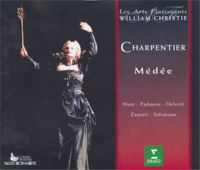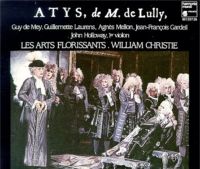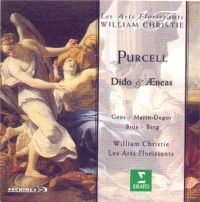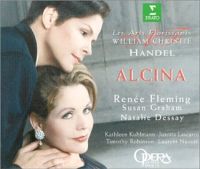The
director of the award-winning ensemble Les Arts Florissants talks about working
with vocalists on the music of the 17th and 18th centuries, and about a new
advanced training program for young artists.
William Christie has come a long way for a boy from Buffalo. After
college and graduate work at Harvard and Yale, he went to Paris for advanced
study on the harpsichord at the Conservatoire. He's never left — he was
awarded the Légion d'Honneur in 1993 and became a naturalized French citizen in
1995, and it is in France (in Paris and Caen) that Christie's renowned ensemble
Les Arts Florissants is based. Founded in 1979, this group has done
extraordinary work in bringing neglected 17th- and 18th-century works to life
for modern audiences — a range of musical riches from oratorios by
Carissimi and Handel to operas by Purcell, Mozart and Gluck. Most of all,
Christie and Les Arts Florissants have done more than anyone else to restore the
great music of the French Baroque — the operas and sacred works of
Jean-Baptiste Lully, Jean-Philippe Rameau and especially Marc-Antoine
Charpentier — to the repertory.

What's more, working with William Christie has
been crucial to the career track of any number of singers, including
(among many others) Véronique Gens, Mark Padmore and Lorraine Hunt Lieberson. Shortly before a performance of Monteverdi's opera Il ritorno d'Ulisse in
patria (The Return of Ulysses) in Caen, andante's Matthew
Westphal spoke with Christie about what he looks for in the singers he works
with.
Matthew Westphal: How did you wind up making your way from being a
harpsichordist to being a director and teacher of singers?
William Christie: I'm not a teacher of singers, first of all — I
don't teach technique at all, I never would. I have very strong ideas about it
but I don't do it — it's very destabilizing for someone to come to me
and then be told that they've got to change techniques. That's something which
happens over a long period of time with a good teacher, a good technical teacher.
As to how a harpsichordist becomes an ensemble person ... well, that's the
nature of the instrument. It collects people around it. It always was the center
of the orchestra or the ensemble [in the Baroque era]; mostly, the people who
played harpsichord were the people who directed.
MW: Your singers — in general are most of them your
students?
WC: That's an exaggeration. In this case [The Return of Ulysses] they're young, with the
exception of the characters who need to be old. Some of them have been singing
with me in other things for a fairly long time, having come in as sort of
— I wouldn't say choir singers, but almost. We've seen already over the
last year an enormous change in some of these voices, in singers who are only 23
or 24 years old. A few are students — I think of the present cast four
or five were in my class at the Paris Conservatory; the others, of course, have
come through the Arts Florissants ensemble or through auditions.
 MW: I was wondering — how do you find singers or how do they find you?
MW: I was wondering — how do you find singers or how do they find you?
WC: It's very simple: you say yes when people write
and ask for an audition — you always say yes. And then you spend a lot
of time doing it.
We do auditions every month, really. That's been even more intense over the
last six to eighth months, with auditions in Prague, Frankfurt, Paris, London,
Zurich, Madrid ... because we chose nine singers (out of several hundred) for
this new pedagogical project we're involved in called Le Jardin des Voix.
MW: Yes, I know that's starting this fall. Tell us some more about it ...
WC: The idea behind Le Jardin des Voix is special:
it's essentially taking people at the beginning of a professional career and
helping them out. That is to say, giving them the chance to sing in fabulous
halls, the best halls in Europe actually, together — in ensembles and
by themselves — in a mixed repertory of 17th- and 18th-century European
music. They'll come together in October [2002] and we'll spend several weeks
working on a program — and also working on basics with other people,
language coaches and diction coaches and style coaches and what-have-you. To
give these people who are already interested in specializing, who like "old
music" in other words, a better understanding of what they're doing —
and then to work very professionally with them on this program, which will be
accompanied by the Arts Florissants orchestra, and take them to these different
halls.
So essentially they're 20 to 30 years old, at the beginnings of careers, in a
moment that's really very critical. You've left school, the conservatory, and
you're on your own, trying to get going.
 MW: Not long ago I saw an interview with Véronique Gens that said when she
was introduced to you, her voice was entirely untrained — and that was
just what you wanted, no habits.
MW: Not long ago I saw an interview with Véronique Gens that said when she
was introduced to you, her voice was entirely untrained — and that was
just what you wanted, no habits.
WC: Well, it's not really true; obviously she had
already been studying voice. I told her she should come back — I
remember vividly, she was 17 or 18 and came with her mother — I said
she should get a little more under her belt. Later she came into the [Arts
Florissants] ensemble as an ensemble singer, as a young soloist with smallish
bits. And obviously the voice began to develop and mature. She's a serious
woman, so she's always studying, and now of course she's a rather grand
lady.
MW: Is there an issue with young singers more generally — do you
find there are habits that have to be unlearned?
WC: I don't really like to unlearn things; I like to give things to people. Occasionally you'll meet very
established singers who just want to sing everything the same way. Why should I
make a effort, they'll ask me, to sound different singing Monteverdi —
well, they don't sing Monteverdi — but to sound different
singing Scarlatti or Handel from when they sing Verdi or Puccini? I don't get
many of those but I have been given a few.
 Basically the whole thing is a question of curiosity, of intellectual
curiosity and intelligence and technique. If you have all three of those you can
do anything you want. In particular with someone like Renée Fleming —
she can sing the most beautiful Strauss in the world, but when she comes to sing
Handel, she switches off certain priorities and she switches on others. She
listens — she's a sponge, in the most wonderful way. And since
she's got glorious technique she can do the things you ask her to do.
Basically the whole thing is a question of curiosity, of intellectual
curiosity and intelligence and technique. If you have all three of those you can
do anything you want. In particular with someone like Renée Fleming —
she can sing the most beautiful Strauss in the world, but when she comes to sing
Handel, she switches off certain priorities and she switches on others. She
listens — she's a sponge, in the most wonderful way. And since
she's got glorious technique she can do the things you ask her to do.
MW: I saw in another recent interview with you that you have "pipe dreams"
— you get all excited, for example, about Weber's Der
Freischütz. Do you think you'll be moving at all in that
direction?
WC: Oh, I have pipe dreams, but I'm much more
cautious than a number of my colleagues, I think. First of all, I'm extremely
content with two centuries that are extraordinarily rich. Some of my colleagues
seem to think that somehow you cut your teeth in the Baroque and then go on to
bigger and better things. That's nonsense. I could spend five lives and never
get through the things I want to get through in the 17th and 18th centuries.
Also, when you're talking about later repertory — that is to say,
post-Rameau or post-Bach — well, that is the 18th century and
there is an extraordinary continuity, despite the change in styles. I like to
think of Mozart and Haydn and quite a bit of Beethoven as belonging to the 18th
century. It seems to me much more interesting to approach Mozart as someone who
comes just before late Haydn or Beethoven than to sort of come back to him
tramping through an awful lot of Romantic and post-Romantic and contemporary
music.
If you would like to respond to this
interview, please write to letters@andante.com.














 MW: I was wondering — how do you find singers or how do they find you?
MW: I was wondering — how do you find singers or how do they find you?
 MW: Not long ago I saw an interview with Véronique Gens that said when she
was introduced to you, her voice was entirely untrained — and that was
just what you wanted, no habits.
MW: Not long ago I saw an interview with Véronique Gens that said when she
was introduced to you, her voice was entirely untrained — and that was
just what you wanted, no habits. Basically the whole thing is a question of curiosity, of intellectual
curiosity and intelligence and technique. If you have all three of those you can
do anything you want. In particular with someone like
Basically the whole thing is a question of curiosity, of intellectual
curiosity and intelligence and technique. If you have all three of those you can
do anything you want. In particular with someone like 